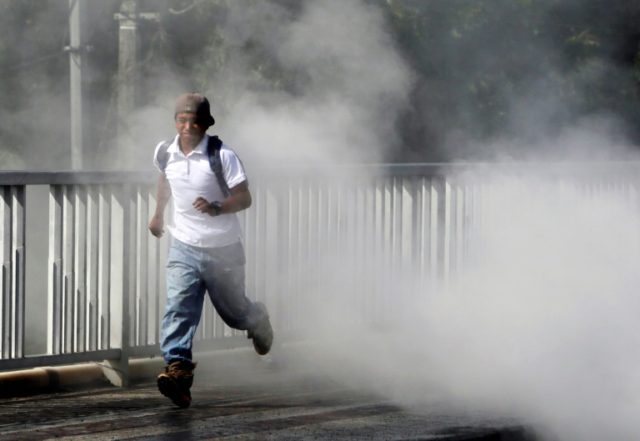Managua (AFP) – Nicaragua prepared Wednesday for a nationwide strike to protest “extreme conditions” under President Daniel Ortega, the target of a two-month long uprising that’s left at least 152 people dead.
The announcement from the Central American country’s top civic alliance that a 24-hour work stoppage was to begin Thursday at 12:00 am (0600 GMT) triggered a mass rush to supermarkets throughout Nicaragua to stockpile supplies.
“This is a national and peaceful civil strike that covers the entire country and all economic activities, except those related to the preservation of life and the coverage of basic services for the population,” announced the National Alliance for Justice and Democracy.
The coalition made up of civil, student and business representatives is a key player in the now stalled talks to quell the crisis, which has seen brutal clashes between anti-government activists and security forces loyal to Ortega.
The group demanded an “immediate” decision from Ortega on the prospect of reviving negotiations mediated by Nicaragua’s influential Catholic bishops.
The country has not heard from its leftist leader since last week, when he met with top clergy members. The bishops had presented Ortega with a plan to expedite the next presidential poll slated for late 2021 and institute electoral and constitutional reforms — key activist demands.
“Dialogue is the way to review the political system of Nicaragua from its root to achieve an authentic democracy and justice,” the civic alliance said.
The call to strike comes as the country experiences a sharp escalation in violence, with police and pro-government paramilitaries attacking activists armed with slingshots and homemade mortars in an attempt to trample the anti-Ortega unrest.
– Economic upheaval –
Managua’s archdiocese welcomed the work stoppage, calling it an “expression of national unity and peaceful protest in the face of the serious political crisis we are experiencing.”
Activists have erected blockades on more than two-thirds of the country’s roads in a bid to fend off anti-riot forces and pressure Ortega into dialogue.
But the makeshift roadblocks have wreaked economic havoc: even in the unlikely scenario that the government “accepts an early negotiated exit” by the end of July, the Nicaraguan Foundation for Economic and Social Development (FUNIDES) estimates the country would post losses of $404 million and bleed 20,000 jobs.
FUNIDES anticipates Nicaragua would lose $916 million in added value and 150,000 jobs by December if Ortega stubbornly stays in office and protests continue.
The protests that began April 18 over controversial pension reforms have exploded into a mass effort to pressure the president’s exit.
At least 152 people have died in clashes with security forces and armed gangs loyal to Ortega, according to the Nicaraguan Center for Human Rights (CENIDH), which also said 1,340 had been wounded.
– ‘Staggered civil war’ –
Facing violence from government-backed forces, some Nicaraguans appear ready to take up arms.
“For me, what is happening is a staggered civil war,” said a student leader known as “El Gato” who is among the hundreds who have occupied Managua university grounds in protest for more than a month.
“Most of us don’t want to see it like that, but personally I think there is going to have to be a moment in this story when we’re going to have to arm ourselves to be on the same level as them,” he said.
Ortega’s Sandinista guerrilla army ousted the Somoza dictatorship in 1979, installing a communist junta.
But even activists who had fought with Ortega are now turning on him.
“El Gato,” who covered his face with a bandana to mask his identity, said that Nicaragua was teetering at a breaking point before the protests.
“For many years, I have been observing and keeping silent for fear of reprisals,” the 25-year-old said.
“I believe that this fight is just — we are fortified in here to pressure the government and speak out against what it’s been doing against Nicaraguans.”
For how long? His eyes narrowed. “As long as it takes,” he said.

COMMENTS
Please let us know if you're having issues with commenting.